How Edinburgh coped with power cuts, candlelight and a three-day week during the 1972 miners' strike
and live on Freeview channel 276
Let us know what you think and join the conversation at the bottom of this article.
Fifty years ago, a seven-week miners' strike disrupted everyday life across the UK as dwindling coal stocks at power stations led to electricity being rationed. Many factories and offices went onto a three-day week and rotas were published each day in the paper telling people when their area was at risk of being cut off.
The strike began on January 9 and the government thought coal stocks were large enough to keep the lights on, but they had not bargained on the miners staying out so long.
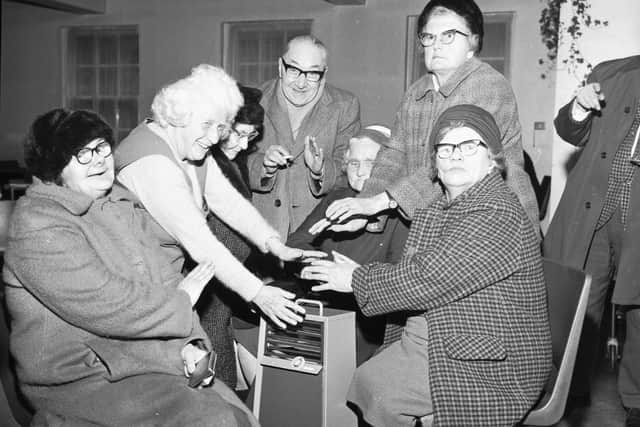

Advertisement
Hide AdAdvertisement
Hide AdOn February 9, the Evening News reported: "Portobello power station, critically short of coal, has been shut down by the South of Scotland Electricity Board. The closure came as prospects of national power cuts grew hour by hour."
That same day a state of emergency was declared and the first power cuts hit areas including West, Mid and East Lothian. They became a regular routine for nearly three weeks.
On February 11, the Evening News announced: "A ban on the use of electricity for heating offices, shops, public halls, catering establishments and premises used for recreation, entertainment and sport begins tomorrow." It added that several hundred workers at the Ferranti factory at Robertson Avenue were sent home at lunchtime.
The same paper carried a notice from the SSEB explaining: "Rationing of electricity between the hours of 6am and midnight is now in force and will continue until further notice. Consumers will be disconnected on weekdays on a rota basis for two or possibly three periods each lasting for roughly three to four hours."
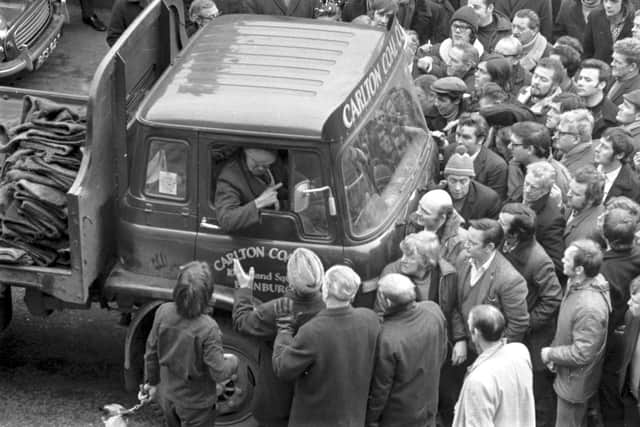

Advertisement
Hide AdAdvertisement
Hide AdThe next day the News reported a "big clampdown on sport and entertainment as power cuts blacked out homes and shops". Meadowbank sports centre and Hillend artificial ski slope were closed, the Commonwealth Pool would shut on Monday.
"Concerts at the Usher Hall have been cancelled until further notice, cinemas face the possibility of films blacking out and plays at city theatres are jeopardised. The ABC film centre in Lothian Road said that if power cuts hit the cinema tonight readmission tickets will be issued."
But the paper also noted: “Despite the ban of floodlighting for sport and entertainment, the Powderhall meeting will go on as unusual tonight. The greyhound authorities maintain the restrictions do not apply to them.”
One Edinburgh pensioner wrote in her diary for Saturday February 12: "Power cuts 9am-12.30pm and 3pm-6.15pm. Went to Binns in afternoon, most folk used stairs in case of power cut. Electricity cut by the time I reached Boots – assistants using strong torches. Tea by candlelight."
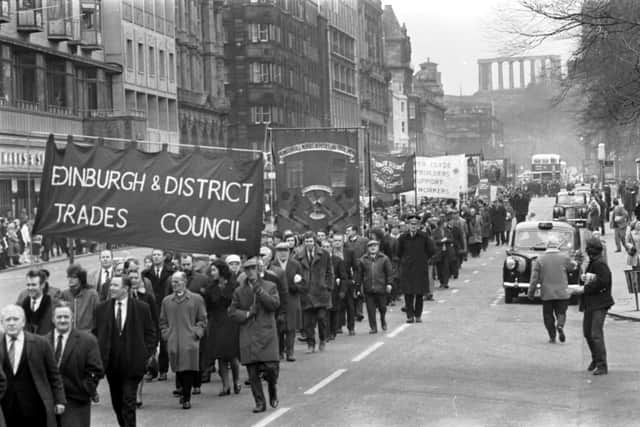

Advertisement
Hide AdAdvertisement
Hide AdThe next day she recorded: "Power cut again at 9am. Main church doors kept closed to conserve heat produced overnight. Power came on again at noon."
And on Monday February 14 she wrote: "Had to get up early to carry down bin because the pitch dark stairs and street scared me last night."
That Monday saw two primary schools – Mordeun and St Catherine's RC, Gracemount Drive – become the first to close.
By the Tuesday, the News was reporting: "Shops besieged by anxious householders are having to turn people away as supplies of candles, portable gas cooker and lamps, and paraffin heaters are rapidly drying up.
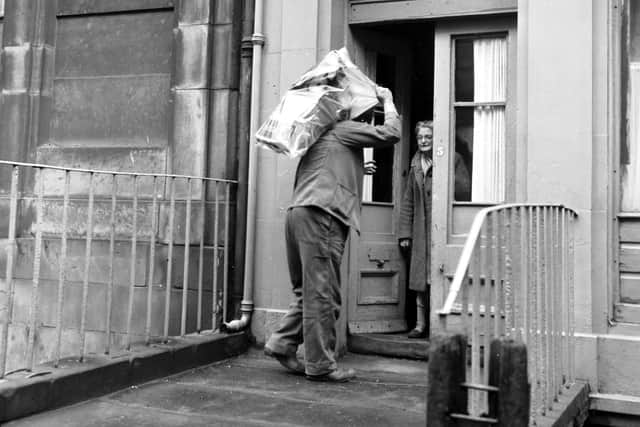

Advertisement
Hide AdAdvertisement
Hide Ad"At the only candlemakers listed for the Edinburgh area, AM Morrison of Musselburgh, the 1000 ornamental candles made daily are 'going out the door as quickly as they are made'."
And Edinburgh's street lighting was reduced to conserve power. "A squad of about 25 men from the city's lighting department started moving into housing estates to disconnect about five in every six street lights."
The next day the News reported: “Parts of an Edinburgh hospital with 260 elderly patients were without heating and lighting today as the biggest power reductions so far hit Scotland. The power cut at Queensberry House Hospital in the Canongate posed enormous problems for the nursing staff. The matron said it was 'extremely serious'."
The strike had taken Ted Heath’s Tory government by surprise – it was the first national coal stoppage since the General Strike of 1926 – but there was pent-up anger over the 400 pits closures over the previous decade and the number of miners halving from 700,000 to less than 300,000.
Advertisement
Hide AdAdvertisement
Hide AdAnd despite the disruption to daily life, the public were on the miners' sides. They did a dirty and dangerous job and their pay had fallen significantly compared with other workers.
Eventually the government set up a court of inquiry chaired by high court judge Lord Wilberforce to look into the miners' claim.
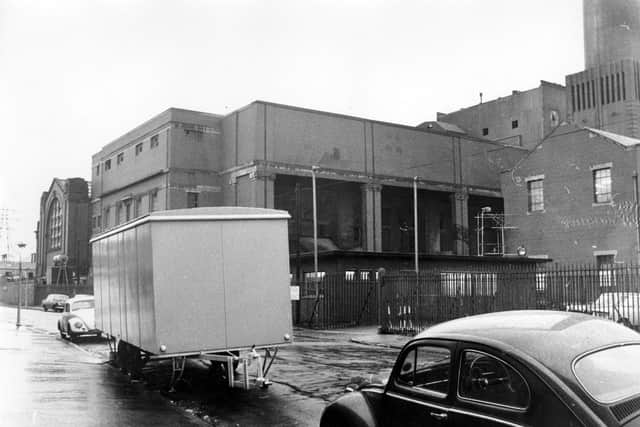

He took just three days to produce his recommendations, agreeing with most of the miners' case and giving them a pay rise averaging 27 per cent, backdated.
It was humiliating for the government, but the National Union of Mineworkers pressed for still more, presenting a shopping list of demands including longer holidays.
Advertisement
Hide AdAdvertisement
Hide AdThe Cabinet met by candlelight that evening before Heath met the miners' leaders and conceded their demands in talks which ended at 1am.
A poll found 81 per cent of the public thought the settlement fair.
Despite the settlement, the low coal stocks meant power cuts continued for another week or so.
The pensioner noted in her diary for February 26: "Power cut 9am-noon and from 9.20pm onwards – settled down to sleep at 10pm because reading by candlelight is a bit sore on the eyes."
Advertisement
Hide AdAdvertisement
Hide AdThe government's poor handling of the strike prompted a re-evaluation of emergency planning and led to the creation of the Cobra system for dealing with crises still used today.
Two years after the strike, Heath found himself embroiled in another dispute with the miners, the imposition once more of a three-day week and this time to a general election and the defeat of the Tory government.
A message from the Editor:
Thank you for reading this article. We're more reliant on your support than ever as the shift in consumer habits brought about by coronavirus impacts our advertisers.
If you haven't already, please consider supporting our trusted, fact-checked journalism by taking out a digital subscription.
Comment Guidelines
National World encourages reader discussion on our stories. User feedback, insights and back-and-forth exchanges add a rich layer of context to reporting. Please review our Community Guidelines before commenting.
